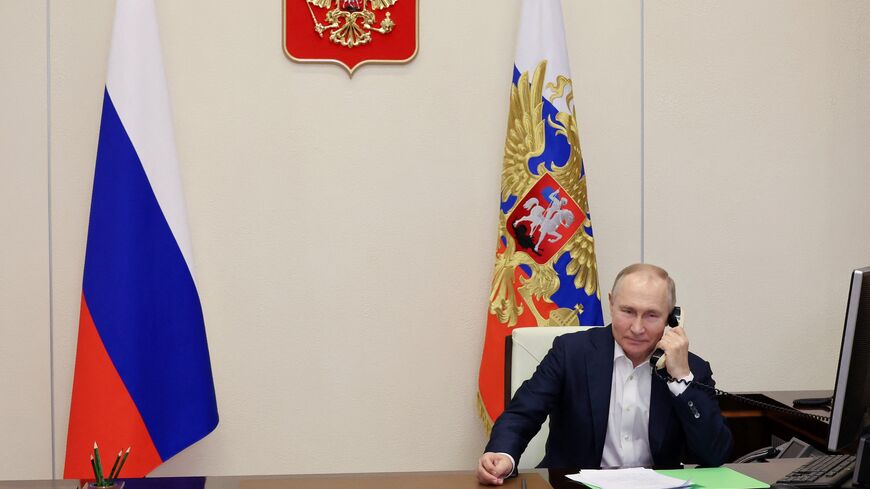Saudi Arabia’s Crown Prince Mohammed bin Salman (MBS) received a phone call from Russian President Vladimir Putin on Wednesday. The two leaders discussed increasing economic ties as well as balancing oil demand and prices, according to Saudi and Russian state news agencies.
The call comes as US Secretary of State Antony Blinken visits Saudi Arabia, and held a nearly two-hour meeting with MBS on Tuesday. Riyadh has improved its ties with both Russia and China since MBS became crown prince in 2017.
It also follows Saudi Arabia's decision on Sunday to voluntarily slash 1 million barrels per day (bpd) from its oil exports starting in July as a precautionary measure against global pressures on the oil market. The announcement came shortly after the meeting of member states and allies of OPEC, of which Saudi Arabia and Russia are members, to maintain cuts from its April meeting.
The International Monetary Fund (IMF) projected Wednesday that Saudi Arabia’s gross domestic product growth will slow to 2.1% in 2023, lower than its 3.1% forecast in May.
What happened: The Saudi Crown Prince and Putin had a phone conversation on Wednesday that outlined cooperation within OPEC+, the state-owned Russian News Agency (TASS) reported.
"Both sides praised the level of cooperation within the OPEC+ [meeting], which make[s] it possible to take timely and efficient steps in order to maintain the balance of oil demand and supply. The sides noted the importance of the agreements in this regard, achieved during the recent ministerial meeting," the Kremlin statement read.
Russian Interior Minister Vladimir Kolokoltsev, who faces sanctions from the West, visited Riyadh to meet with Saudi Interior Minister Prince Abdulaziz bin Saud on May 23, only days after Ukrainian President Volodymyr Zelenskyy appealed for support from members of the Arab League at the group’s yearly summit, held in Jeddah.
The last time Putin and the Prince Mohammed shared a phone call was April 21, according to TASS.
Why it matters: The Saudi economy grew 8.7% last year. Increased oil prices helped maintain high revenue while the rest of the world was facing a slowdown, averaging 3.6% in 2022 according to the IMF. The kingdom experienced its first budget surplus in almost 10 years, according to Reuters.
Days after Saudi Arabia’s Energy Ministry said the country would drop its oil output to 9 million bpd from 10 million bpd starting in July in a Sunday press release, the IMF lowered its forecast for the kingdom’s 2023 economic growth to 2.1%, down a full percent from its 3.1% forecast in May.
At a news conference Sunday after the OPEC meeting, Saudi Energy Minister Prince Abdulaziz called the cut a "Saudi lollipop."
“We wanted to ice the cake. We always want to add suspense. We don’t want people to try to predict what we do. … This market needs stabilization,” he added, according to Reuters.
Background: OPEC+ members have made cuts totaling 3.66 million bpd since late last year. The total includes voluntary cuts of 2 million bpd that started in November of 2022 and an additional 1.66 million bpd reduction in April of this year.
The November reduction came after the United States asked Saudi Arabia and OPEC members not to make production cuts. The 2 million barrels slashed per day by the October decision accounted for 2% of world demand and led US President Joe Biden to vow consequences.
Additional voluntary production cuts from the top oil exporter Saudi Arabia and previous cuts from OPEC+ members have agitated Western countries and international organizations, which accuse the oil-producing countries of contributing to the global economic slowdown.
In late April, the International Energy Agency warned OPEC+ and its allies to stop cutting oil production and instead shift toward renewable energy so that oil prices do not burden global economic growth and further drive inflation.
At the Qatar Economic Forum in late May, the country’s Energy Minister Saad al-Kaabi warned governments that the massive push for energy transition policies is negatively affecting the stability of the fossil fuel industry, which will critically affect many regions, including Europe.
“There’s going to be a big shortage in gas in the future, predominantly because of the energy-transition push that we’d say is very aggressive,” he said.
“Economic stability and environmental responsibility are not mutually exclusive. You have to have both," he added.


.jpg?h=484aaada&itok=l9O0K7bm)




